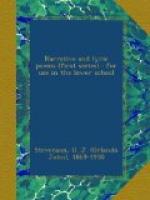[41] Ramnian. The Ramnes were one of the three tribes of which the Roman people were mainly comprised; the Tities were a second of these tribes; Horatius himself belonged to the Luceres, the third tribe, so that in the defence of the bridge all three tribes were represented.
[42] The story is supposed to be told by one of the plebeians, or common people in Rome, about 120 years after the event took place.
[43] The speaker voices the grievances of the Plebeians against the Patricians.
[44] Tribunes. The officers appointed to defend the rights of the Plebeians against the encroachments of the Patricians.
[45] beard. openly defy.
[46] harness. armour.
[47] Tifernum. A town on the river Tiber.
[48] Ilva. Elba, an island in the Mediterranean, on the coast of Italy.
[49] Nequinum. Narni, on the Nar, which is a tributary of the Tiber.
[50] Falerii. One of the twelve Etruscan cities.
[51] Urgo. An island in the Mediterranean.
[52] rover of the sea. pirate.
[53] Cosa. A town on the sea-coast.
[54] Albinia. A river in Etruria.
[55] Campania. A district along the sea-coast.
[56] hinds. peasants.
[57] The she-wolf’s litter. A reference to the legend, of Romulus and Remus, the mythical founders of Rome, who were said to have been suckled by a she-wolf.
[58] Palatinus. The Palatine Hill, one of the seven hills of Rome.
[59] changing. exchanging.
[60] ween. think, fancy.
[61] of public right. Belonging to the state.
[62] Comitium. That part of the Roman forum, or public square, where the Patricians were accustomed to meet.
[63] To charge the Volscian home. The Volsciana lived in the southern part of Latium. They were constantly at war with the Romans. Home is here an adverb strengthening the meaning of charge.
[64] Juno. Wife of Jupiter, and queen of heaven.
[65] Algidus. A hill about twelve miles from Rome.
Alice brand.
Merry it is in the good greenwood,
When the mavis and merle[1]
are singing,
When the deer sweeps by and the hounds
are in cry,
And the hunter’s horn
is ringing.
“O Alice Brand, my native land
5
Is lost for love of you;
And we must hold by wood and wold,[2]
As outlaws wont to do.
“O Alice, ’twas all for thy
locks so bright,
And ’twas all for thine
eyes so blue, 10
That on the night of our luckless flight
Thy brother bold I slew.
“Now must I teach to hew the beech
The hand that held the glaive,[3]
For leaves to spread our lowly bed,
15
And stakes to fence our cave.
“And for vest of pall,[4] thy fingers
small,
That wont on harp to stray,
A cloak must shear from the slaughtered
deer,
To keep the cold away.”
20




